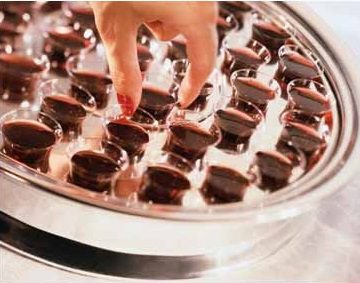
Baptist communion elements; photograph by “Alanscottwalker” (4-23-11) [Wikimedia Commons / Creative Commons Attribution-Share Alike 3.0 Unported license]
*****
From my book, Biblical Catholic Eucharistic Theology (2011).
*****
The historical reason for use of grape juice is the anti-drinking temperance movement of the mid-19th and early 20th centuries. Once it changed, then there was probably an urge to justify it on theological or spiritual grounds, since caving into cultural movements without always stellar biblical backing is not exactly the best rationale in changing a time-honored Christian rite — which had already been ravaged by widespread Protestant disbelief in the Real Presence.
Behind the temperance movement was not only a commendable opposition to drunkenness, but also often a belief that all alcohol consumption whatever is sinful: a notion that is clearly unbiblical and untrue. But this was largely an American phenomenon.
All of the major Protestant confessions of the 16th and 17th centuries: Belgic Confession (1561); The Heidelberg Catechism (1563); 2nd Helvetic Confession (1566); Westminster Confession of Faith (1647); London Baptist Confession of 1689) prescribed the use of wine in Holy Communion. Many prominent Protestant theologians, even through the 19th century, agreed. For example:
Charles Hodge (1797-1878):
By wine as prescribed to be used in this ordinance, is to be understood ‘the juice of the grape;’ and ‘the juice of the grape’ in that state which was, and is, in common use, and in the state in which it was known as wine. The wine of the Bible was a manufactured article. It was not the juice of the grape as it exists in the fruit, but that juice submitted to such a process of fermentation as secured its preservation and gave it the qualities ascribed to it in Scripture. That oinos in the Bible when unqualified by such terms as new, or sweet, means the fermented juice of the grape, is hardly an open question. It has never been questioned in the Church, if we except a few Christians of the present day. (Systematic Theology, Vol. III, 616)
Archibald Alexander Hodge (1823-1886):
What is the meaning of the term oinos, wine, in the New Testament, and how does it appear that wine and no other liquid must be used in the Lord’s Supper?
It is evident from the usage of this word in the New Testament that it was designed by the sacred writers to designate the fermented juice of the grape – Matt. 9:17; John 2:3-10; Rom. 14:21; Eph. 5:18; 1 Tim. 3:8; 5:23; Titus 2:3. This is established by the unanimous testimony of all competent scholars and missionary residents in the East… That wine and no other liquid is to be used is clear from the record of the institution, Matt. 26:26-29, and from the usage of the apostles. (Outlines of Theology, New York: Robert Carter & Brothers, 1863, 633-634)
The contents of the cup were wine. This is known to have been “the juice of the grape,” not in its original state as freshly expressed, but as prepared in the form of wine for permanent use among the Jews. “Wine,” according to the absolutely unanimous, unexceptional testimony of every scholar and missionary, is in its essence “fermented grape juice.” Nothing else is wine. The use of “wine” is precisely what is commanded by Christ in his example and his authoritative institution of this holy ordinance. Whoever puts away true and real wine, or fermented grape juice, on moral grounds, from the Lord’s Supper sets himself up as more moral than the Son of God who reigns over his conscience, and than the Saviour of souls who redeemed him. There has been absolutely universal consent on this subject in the Christian Church until modern times, when the practice has been opposed, not upon change of evidence, but solely on prudential considerations. (Evangelical Theology, reprinted by Edinburgh: Banner of Truth Trust, 1976, 347-348)
John Calvin, Theodore Beza, Francois Turretin, Jonathan Edwards, John Gill, Robert Dabney, W. G. T. Shedd, Benjamin Warfield, J. Gresham Machen, Louis Berkhof, Herman Hoeksema, and G. C. Berkouwer all taught this.
*****
Meta Description: Critique of the Protestant use of grape juice rather than wine, for Holy Communion, or the Lord’s supper.
Meta Keywords: Holy communion, Protestants & Catholic communion, Eucharist, liturgy, bread & wine, grape juice for communion, temperance movement, alcohol, Bible & alcohol, Protestant sacraments, Lord’s Supper

















